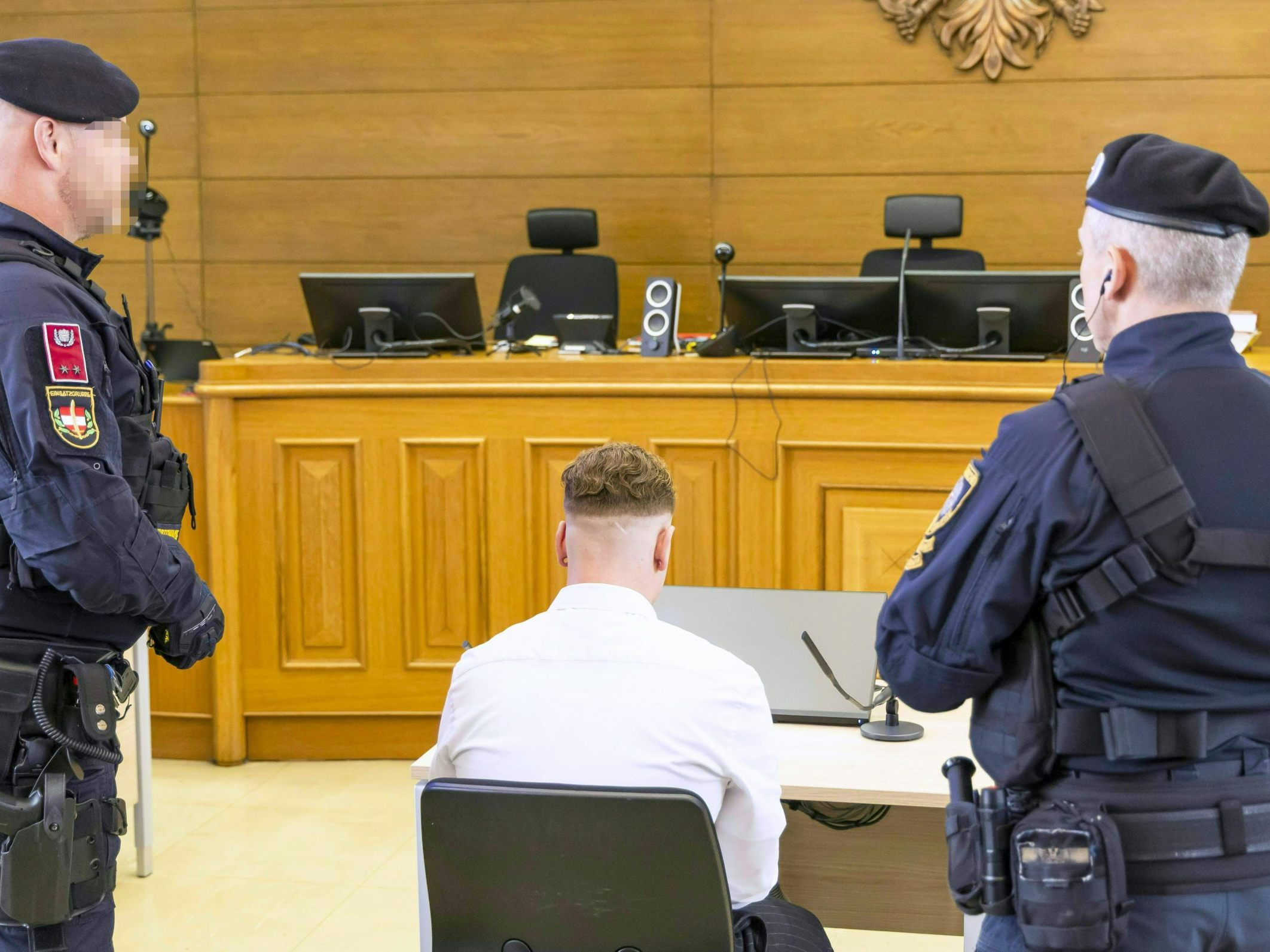Comrade Shot in Carinthian Barracks: Murder Trial Ends with Conviction

After a 20-year-old conscript fatally injured a colleague one year older with a shot in the Türk Barracks in Spittal an der Drau last October, he was found guilty of murder at the Klagenfurt Regional Court on Wednesday. The young man was sentenced to twelve years in prison, the verdict is not final.
Tumult after trial
Immediately after the verdict was announced, there was an uproar: Numerous family members of the victim with a Turkish background found the prison sentence obviously too low. They loudly demanded a higher sentence. On the way out, a disinfectant dispenser was also broken. In front of the courthouse, the few police officers who had overseen the trial visibly struggled to control the situation, and there were also clashes among the relatives themselves. Several police patrols, including service dog handlers, were ordered to the park in front of the courthouse, where the situation then calmed down relatively quickly.
Unanimous guilty verdict, deliberate action determined
The jury decided with eight to zero votes that the act was a murder. Judge Dietmar Wassertheurer, who presided over the jury court, said the defendant repeatedly contradicted himself. "The act was not premeditated. But it was decisive that you - despite repeated instruction - aimed the weapon at your victim and consciously pulled the trigger." With this, the defendant "knowingly accepted" that his victim would be killed.
In determining the sentence, they remained in the lower range for the previously unblemished man: "We assume that this is appropriate to the guilt and the act." Neither the defendant's lawyer nor the prosecutor made a statement.
Defendant spoke of "accident"
The fatal shooting occurred on the afternoon of October 22 in the guard room of the barracks, where the defendant was on duty. After the later victim entered, the shot was fired about two minutes later. According to the indictment, the 20-year-old had taken his pistol from the holster, aimed it at the 21-year-old, and pulled the trigger. The projectile penetrated the 21-year-old's chest and exited through his back. Despite rapid emergency medical assistance, he died from bleeding due to the lung shot in the shock room of the Klagenfurt Clinic.
The defendant admitted to firing the shot after his arrest, but claimed it was unintentional. However, this was not credible, as prosecutor Doris Wieser pointed out the defendant's changing statements: First, he said the gun belt had fallen off, causing a shot to be fired. Later, he claimed he was "startled" when the future victim entered and the weapon fell from the holster - a video was referenced showing that the future deceased had already been in the guard room for two minutes before the shot was fired.
The defendant's lawyer, Kurt Jelinek, spoke of a "tragic accident." The defendant and the victim knew and understood each other, and there was no reason why his client would have wanted to kill his colleague. The 20-year-old pleaded guilty to grossly negligent homicide: "He created a dangerous situation with the weapon, which should not have happened." Several times, the lawyer apologized on behalf of his client to the family of the deceased, who were also present in the courtroom.
The defendant himself stated that he was walking around the guard room and "playing" with the pistol by slightly pulling it out of the holster and letting it fall back in. Eventually, he wanted to remove the belt because he felt unwell. Suddenly, the future deceased spoke to him: "I didn't realize someone was there. I was startled, noticed something falling, then I reached out and heard a bang." He did not initially realize it was a shot. Even after repeated questioning by Judge Dietmar Wassertheurer, who presided over the jury, the defendant could not explain exactly how this "reaching out" occurred.
Weapon Report: No Technical Defect
The firearms expert, Manuel Fließ, concluded in his investigations that both the weapon and all safety mechanisms functioned flawlessly. He had rigorously tested the weapon, dropping it or hitting it with a rubber hammer: "In no case did a shot go off." The holster in which the weapon was placed also functioned perfectly: "I let the pistol fall into it several times or let it slide in very carefully. It always locked in place, so it couldn't fall out."
Prosecutor Wieser stated in her closing argument that there was a victim, they knew why he died, and they also had the perpetrator: "The only thing we don't have is a motive." Whether it was a dispute or the defendant was "fooling around" with the weapon, they did not know. In any case, she saw a "conditional intent" present: "Everyone knows that someone can die if you pull the trigger of a weapon."
Jelinek disagreed: "It was a tragic, fateful accident," the lawyer repeated. In case of doubt, the more favorable version for the defendant should be chosen, he appealed to the jurors. The fact that his client could not say more about the exact sequence of events did not automatically speak against him. He had committed a misconduct that he could no longer explain - but it was not murder.
(APA/Red)
This article has been automatically translated, read the original article here.





